Saving the peewit: Hope for 'iconic' country bird
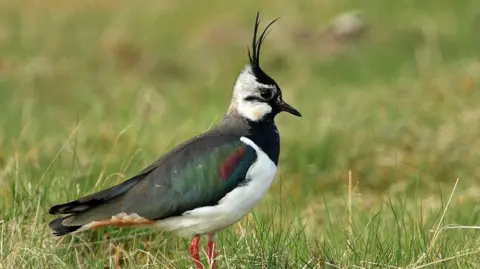 David White
David WhiteAn "iconic" bird with a noticeable hairdo is on the red list for conservation after numbers have more than halved since 1967 - could farmers help bring them back?
Peewit is the traditional name for the northern lapwing, or green plover, or - if you like your Latin - Vanellus Vanellus, meaning little fan, a reference to the sound when it flies.
"It's very similar to their sound, their call. Peewit as they go off in the mornings," explained Sid Vincent, a gamekeeper working for a local farmer.
He has noticed the decline in the birds after decades working in the countryside and is becoming a volunteer for Project Peewit in Wiltshire, which is aiming to help the lapwing.
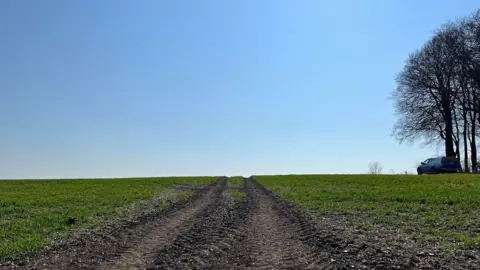
Wiltshire Wildlife Trust is behind the project, collaborating with volunteers on the Marlborough Downs who work on the land the birds nest in. It mostly includes farmers, gamekeepers and regular walkers.
"They are just the most beautiful bird," said David White, one of the farmers in the area this project has started in. "To me, they are just the iconic bird of the Marlborough Downs.
"They're part of our heritage really."
A group of farmers in the Marlborough Downs Space for Nature project are already trying to help other bird species.
David is one of them: "If you create the habitat, the wildlife will come in. Then you've got to manage that habitat and hope you get some success."
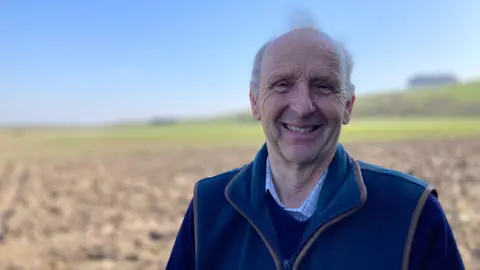
Where have they gone?
The peewit has not just flown away. Jonny Cooper, from Wiltshire Wildlife Trust, is behind the project and he explained peewits are struggling to breed.
"The idea behind this project is to understand their breeding success," he said. "They're not fledging enough chicks."
He said the reasons for this are complex and varied and range from climate change and changes in farming, to an increase in predator numbers and struggles with finding food as there are fewer bugs for them to eat.
There is also concern about nest disturbance, such as if dogs off of leads.
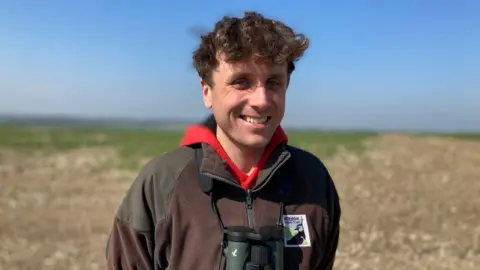
One of the issues is chicks are easy prey. The birds nest on the ground and scoop out a small dent for eggs, usually in a bare patch of ground without crops.
The idea is they can then see predators coming, but more predators hunting for fewer peewits is not helping matters.
The decline in insects affects lots of creatures, including the lapwing. Some chicks have been found to die of starvation when there have not been enough invertebrates to eat.
Farmers are being asked to keep an eye on insect populations too so the project can see how peewits might be choosing their food sources.
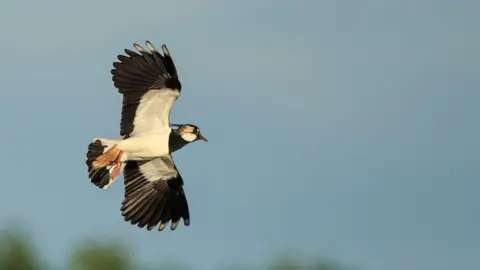 David White
David WhitePoo Power
There are a couple of ways the lapwing diet and bug population can be monitored: firstly, with insect traps to see what land has what, but also via poo.
Mr Cooper has been putting together kits to check on chick poo.
In a brown paper bag, he has a tray, and wire grating for the top. The chicks would be popped on top of the wire for no more than a few minutes, during which time they hopefully go to the loo and be released.
The poo can then be studied to see what the chicks have been eating.
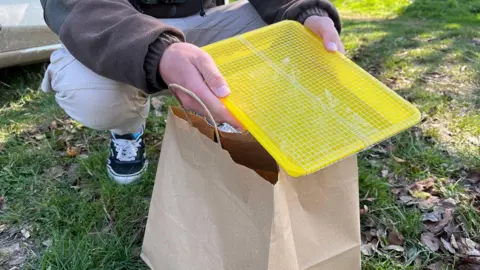
Mr Cooper described the input of farmers as critical to the project.
"We have to get farmers involved," he said. "We can come in and do work but ultimately it's the people who own the land and manage the land who are instrumental."
Farmers are being encouraged to let him know when they see a peewit nest, create patches of ground ideal for nesting and help monitor the birds and bugs.
Farmer James Hussey hosted the introductory training day for the project.
He said: "It's lovely to get this group together. Like so much conservation, the larger scale you do it on, the more chance the birds have of recovering numbers."
He is already making changes to help wild birds and said he believes other Wiltshire farmers will get "lapwing envy" in the future, rather than "wheat yield envy".
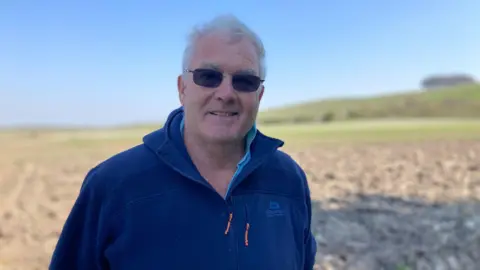
"I think there is hope," said Mr White, who also photographs local birdlife.
"As long as we pull together and do everything we can. All we have to do is provide a bare area of ground, it can't be cropped, then the birds will find that."
Follow BBC Wiltshire on Facebook, X and Instagram. Send your story ideas to us on email or via WhatsApp on 0800 313 4630.
